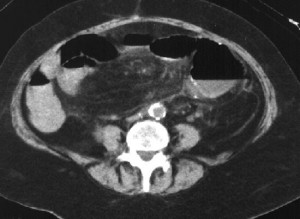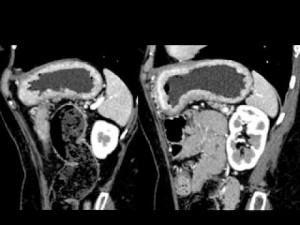Mesenteric Ischemia is a highly discomforting abdominal condition that causes stomach pain after meals. Read and find all about the various causes, symptoms and treatment of the condition.
What is Mesenteric Ischemia?
Page Contents
- 1 What is Mesenteric Ischemia?
- 2 Mesenteric Ischemia Types
- 3 Mesenteric Ischemia Causes
- 4 Mesenteric Ischemia Risk Factors
- 5 Mesenteric Ischemia Signs and Symptoms
- 6 Mesenteric Ischemia Diet
- 7 Mesenteric Ischemia Tests and Diagnosis
- 8 Mesenteric Ischemia Differential Diagnosis
- 9 Mesenteric Ischemia Treatment and Management
- 10 Mesenteric Ischemia Complications
- 11 Mesenteric Ischemia Prognosis
- 12 Mesenteric Ischemia Life-Expectancy
- 13 Mesenteric Ischemia Prevention
Also known as Mesenteric Artery Ischemia, it is a condition that generally affects the small as well as the large intestines. It may give rise to various serious health conditions including bowel infarction, sepsis and even death. The disease generally affects individuals aged above 60 years.
Mesenteric Ischemia Types
The condition is categorized into different types, such as:
- Mesenteric Artery Embolism
- Mesenteric Artery Thrombosis
- Mesenteric Vein Thrombosis
- Nonocclusive Mesenteric Ischemia
Mesenteric Ischemia Causes
This condition can be both chronic and acute. Chronic means the patient is suffering from the disease for very long time periods which often causes weight loss. The main cause of development of this disease is a lack of blood flow through the arteries which prevents the intestines from receiving adequate amounts of oxygen for digestion. This can occur due to:
Picture 1 – Mesenteric Ischemia
Atherosclerosis
It is one of the most common causes of this disease. It lessens the amount of blood that flows through arteries. In healthy people, the insides of the arteries are smooth and do not obstruct proper flow of blood. With age, however, a sticky substance known as “plaque” develops in the walls of the arteries. It is formed by fats and various materials that circulate in the bloodstream. Large amounts of plaque can constrict and stiffen the arteries. This can eventually lead to reduced blood flow.
Embolus
It is a type of blood clot that may act as a causative factor for this disorder. Embolus travels to the mesenteric arteries and suddenly causes a blockage in the blood flow. These clots generally develop in the heart. They are relatively common among individuals with irregular heartbeat and heart patients.
Acute Mesenteric Ischemia may arise from various serious health disorders such as shock, chronic kidney failure, heart failure and certain medications.
Mesenteric Ischemia Risk Factors
The main risk factors of this disorder are as follows:
- Aging. It is the most important risk factor of this condition as its onset occurs after the age of 60.
- High cholesterol levels
- History of smoking
- Certain medications
- Use of illegal drugs
This condition may also arise from health disorders like:
- Congestive heart failure
- Low blood pressure
- Aortic dissection, or a breakage in the inner layer of the aorta
- Occlusion and blockage of the bowel veins
- Coagulation disorders
- Rare blood vessel disorders like Arteritits and Fibromuscular Dysplasia
Mesenteric Ischemia Signs and Symptoms
The symptoms of this condition can be differentiated into three progressive phases:
Hyper Active Phase
In this stage, severe abdominal pain and bloody stools are some of the primary symptoms displayed by patients. In most cases, the disease does not progress to an advanced phase as patients generally get better after receiving treatment at this stage.
Paralytic Phase
It is the second stage of the condition. The abdominal pain spreads to a wider area and the belly gets more and more tender. This stage also reduces bowel motility, which results in abdominal bloating. In this stage, blood is not noticed in stools any more.
Shock Phase
It is the final stage of the disease in which there is leakage of fluids through the broken colon linings. This can lead to shock as well as metabolic acidosis with low blood pressure, dehydration, confusion and rapid heart rate. Patients almost always require intensive care at this stage.
Some other symptoms associated with this disorder involve:
- Abdominal pain after meals
- Nausea
- Great fear of eating as eating causes pain
- Vomiting
- Diarrhea
- Frequent and forceful bowel movements
- Abdominal tenderness
- Fever
- Flatulence
- Constipation
Mesenteric Ischemia Diet
This disease is caused by diffuse atherosclerosis occurring in the arterial tree. Individuals having heavy, fatty meals may experience severe postprandial pain. Hence, patients suffering from chronic or acute cases of this disorder should follow a diet mainly comprising of low-fat foods and plenty of fruits and vegetables. They should also take multiple light meals instead of two or three large meals.
Mesenteric Ischemia Tests and Diagnosis
It is difficult to diagnose this condition at an early stage. The tests used for diagnosing this disorder include:
Blood Tests
Blood tests are done to see if the white blood cell count is normal and to determine the level of Lactic acid.
X-Ray
X-ray plates often fail to identify any abnormalities in the intestines of the patients.
Computed Tomography or CT Scan
The CT scan helps to determine if the arteries are damaged in any way like aortic dissection. This test diagnoses Mesenteric Ischemia by creating three-dimensional images. Other abdominal organs of the patient are also tested.
Magnetic Resonance Angiogram (MRA) Scan
MRA also helps to diagnose this condition by producing 3D images of the body vessels. However, this test is used only in case of patients who have some metal implant in their bodies such as artificial hips and pacemakers.
Mesenteric Angiography
This test is used for diagnosing acute Mesenteric Ischemia at a very early stage. X-rays are used in Angiography for studying the blood vessels. The test is known as Arteriogram when used for studying the arteries. A dye is injected into the artery o be tested through a flexible, thin tube called “catheter”. The injection is generally pushed into the groin or arm of the patient. This dye makes it possible to see the blood vessels on an x-ray plate.
Doppler Ultrasound
In this test, high-frequency sound waves are used for diagnosing the syndrome. Sound waves bounce off the blood vessels and blood cells, helping medical professionals identify any abnormality in blood flow and the structure of blood vessels. Any possible obstruction in specific arteries is also determined through this test.
Mesenteric Ischemia Differential Diagnosis
Doctors must rule out presence of other conditions that might be present with this disorder, such as:
- Abdominal Angina
- Abdominal Abscess
- Appendicitis
- Biliary Colic
- Abdominal Aortic Aneurysm
- Aortic Dissection
- Biliary Obstruction
- Cholecystitis
- Boerhaave Syndrome
- Choledocholithiasis
- Gastric Volvulus
- Intestinal Perforation
- Acute Pancreatitis
- Pneumothorax
- Septic Shock
- Esophageal Rupture
- Colonic Obstruction
- Cholangitis
- Myocardial Infarction
Physicians must also differentiate the disease from Ischemic Colitis, a health disorder considered to be less serious than the Acute Mesenteric Ischemia of small intestine – which is a life-threatening condition.
Mesenteric Ischemia Treatment and Management
Both the chronic and acute cases of this disease are treated for re-opening the blocked artery and allowing proper blood flow to the intestines. If there is a threat of permanent damage to the intestines, vascular surgeons use an emergency procedure for treating the condition. Otherwise, a routine procedure is implemented.
Chronic Mesenteric Ischemia Treatment
The main aim of treatment of this condition is to restore blood flow to the intestines. Bypass surgery is often performed for unblocking clogged arteries. Angioplasty therapy and stenting can also be used for widening the narrowed arteries and curing the disease. In some rare cases, another surgical procedure known as Trans-aortic endarterectomy is also used for the purpose. It helps remove the plaque that causes the blockage of the mesenteric artery.
Acute Mesenteric Ischemia Treatment
Acute cases of the disease require emergency treatment. Due to this reason, surgeons bypass the artery blockage or repair the damaged intestinal area by removing the blood clot through a surgery. The treatment generally includes various medications that help prevent blood clot, dilate blood vessels and dissolve clots.
If an angiography is used for the diagnosis, surgeons may remove blood clots and widen the artery with angioplasty at the same time. Angioplasty uses a balloon, inflated at a catheter end, to compress the fat deposits in order to widen the artery and allow adequate flow of blood. Sometimes, a stent (spring-like metallic coil) is placed in the artery to keep it open.
Mesenteric Ischemia Complications
This disease may lead to certain complications, which include:
Picture 2 – Mesenteric Ischemia Image
Death of the intestinal tissues
The intestinal tissue may die in case the blood flow to the intestine is completely blocked. This is a life-threatening situation that needs surgery for clearing the blockage.
Narrowing or scarring of the colon
During healing process, there is development of scar tissues which block the intestines. This occurs even if the intestines have recovered from Ischemia. In these cases, the damaged intestinal portion is removed surgically.
Mesenteric Ischemia Prognosis
In chronic cases, the prognosis is good after a successful surgery. However, patients should maintain a healthy lifestyle which includes following a low-fat diet and exercising regularly. Without lifestyle modification, the condition may arise again.
The outlook of the acute Mesenteric Ischemia is generally poor as the affected intestine often dies before the surgery is performed. However, the condition can be treated successfully with early diagnosis and proper surgery.
Mesenteric Ischemia Life-Expectancy
Acute cases of this disorder constitute the most dangerous abdominal conditions to affect elderly people. Patients of chronic forms of this disease generally have a longer life expectancy compared to those suffering from the acute type.
Mesenteric Ischemia Prevention
Know about some possible ways of preventing this condition:
- Smoking is a major risk factor of the condition. Hence, one should quit smoking to avoid this disorder. Counseling, nicotine replacement products and proper medications may also help an individual give up smoking.
- Exercising for at least 30 minutes every day can also help avoid this disease.
- Maintaining a healthy weight through regular exercise is also important. Individuals with excessive bodyweight should consult their doctors to know how they can lose weight. Eating lesser amounts of calorie-rich foods may help in weight loss.
- Following a healthy lifestyle and keeping health problems like high cholesterol, high blood pressure and diabetes in check can reduce the chances of Atherosclerosis and ultimately prevent this condition.
If left untreated, this intestinal disease can lead to life-threatening complications. Timely diagnosis, proper treatment and a healthy lifestyle allow patients to live an almost normal life.
References:
http://www.mayoclinic.com/health/intestinal-ischemia/DS00459
http://emedicine.medscape.com/article/189146-treatment
http://health.nytimes.com/health/guides/disease/mesenteric-artery-ischemia/overview.html



After reading the info on PrimeHealthchannel.com I found it more informative then anything I’ve ever read. I have Chronic Mesenteric Ischemia for 8 1/2 years, there is a celiac artery graft and 5 stents, and still have problems with kinks/stenosis. Thank you.